Religious freedom and human Rights: The Brazilian experience
DOI:
https://doi.org/10.5216/lahrs.v4.80554Keywords:
Human Rights, Democratic Rule of Law, Secularism, Religious freedom, SecularizationAbstract
This article proposes a reflection on the relationship established between the right to religious freedom and democracy. Freedom of religious belief and religiosity has sought its place in a world that is becoming increasingly plural. However, currently, at the same time that the affirmations of religious plurality occur, it is possible to verify a growing questioning about the existing border between the private and intimate sphere, which legitimizes the freedoms of belief, and the public sphere, which is regulated and it is subject to the administration of collective interests by the Democratic States of Law. Thus, such questioning integrates a problematization that is old, and that remains with vitality, about what is the limit of intervention of a secular state in the private sphere of individuals, and to what extent it is legitimate with regard to freedom of belief. In this sense, its main objective is to understand the fragility of the discourse that permeates the relationship between religion and democracy. To this end, it begins with an analysis of the preservation of freedoms, particularly that of religion and belief, promoted by the Universal Declaration of Human Rights (1948). From there, it is essential to understand the concepts of secularization and secularization. It is worth noting that the latter led to the growing emergence of spheres of social life distinct from a traditional collective political conception, and that secularization, in turn, means discussing the application of law and the functioning of the state. Added to this, it is also worth discussing religious freedom in the context of a Democratic State of Law. Finally, it concludes by highlighting the Brazilian experience, having as a key point the normative interpretation of the Federal Constitution of the Federative Republic of Brazil of 1988.
Downloads
Published
Issue
Section
License
Copyright (c) 2024 Latin American Human Rights Studies

This work is licensed under a Creative Commons Attribution 4.0 International License.
CC BY (Attribution 4.0 International): This license allows reusers to distribute, adapt, and build upon the material in any medium or format, so long as attribution is given to the creator. The license allows for commercial use. See the full license.


